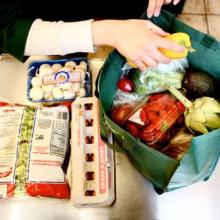food stamps
THE FARM BILL has a profound impact on farming and nutrition. Three key things the multi-faceted bill provides are: a safety net for farmers, incentives for conservation practices, and food assistance for low-income families. Congress writes the farm bill every five to six years; the most recent Farm Bill, approved in 2008, expires Oct. 1.
At present, nearly 80 percent of the bill’s roughly $100 billion a year in spending goes to the food-assistance category, most notably to food stamps—the Supplemental Nutrition Assistance Program, which now helps feed 46 million people in the U.S. Less than 10 percent of current Farm Bill funding supports water and soil conservation practices, such as no-till farming and preserving wetlands and grasslands.
In the past, a significant part of the bill has been commodity payments made under various programs to farmers of crops such as corn, wheat, rice, cotton, and soybeans (but not fruits or vegetables). As farmers are currently benefiting from high grain prices, while the government faces budget deficits, the next Farm Bill seems poised to recognize that the time has come to end commodity payments.
However, farmers, challenged by volatile swings in crop prices and by uncertain weather, still need a safety net. In lieu of commodity payments, the Senate version of the Farm Bill, passed in late June, moves toward subsidizing crop insurance, which covers farmers—including fruit and vegetable growers—against both poor yields and poor prices.
As Congress continues to wage a war of political ideology over budget cuts and entitlement programs, they need to remember that these abstract policy debates have real consequences for millions of Americans.
Deciding between funding programs that feed the hungriest Americans versus giving tax breaks for the wealthiest Americans is not really a choice, at least not when it comes to the demands of the Gospel.
Over at Think Progress, Scott Keys reports on Rep. Allen West's latest comments:
"West, speaking at the Broward County Lincoln Day Dinner this past Saturday, warned the crowd about the danger of food stamps for American society. “In the last 10 years,” West said, the “food stamp program that has gone from about $20.6 billion to over $75 billion.” The Florida congressmen saw this increase not as a society practicing compassion for its most needy, but as a more nefarious plot. “That’s not how you empower the American people,” West declared. “That’s how you enslave the American people.”
Read the full article here
The Huffington Post reports on the drastic rise in the number of people with advanced degrees who are also reliant on government welfare:
The number of Ph.D. recipients on food stamps and other forms of welfare more than tripled between 2007 and 2010 to 33,655, according to an Urban Institute analysis cited by the Chronicle of Higher Education. The number of master's degree holders on food stamps and other forms of welfare nearly tripled during that same time period to 293,029, according to the same analysis.
Learn more here
On the Politico opinion pages, Jason Ackerman examines how food assistance programs could be better utilized:
I am on food stamps. This will surprise almost everyone who knows me. I have hidden it from friends, from family, from classmates.
I use self-checkout at the grocery store so I don’t have to face judgment from the cashiers. I read countless posts on Facebook and receive political emails telling me that being on food stamps makes me a degenerate, someone who is dependant and useless. I hear about how I should be kicked off of food stamps so I won’t be so lazy and will get a job.
At the time the economy crashed, I was studying to be a chiropractor. My (now ex-) husband was laid off from his good job. It took him over a year and a half to find a new job. During that time we lost our house and had to declare bankruptcy. Our marriage fell apart.
I’m now a single mom struggling to make ends meet. I was faced with the decision to quit school and go back to work and pray that somehow I’d be able to make the payments on more than $100,000 in student loans or to press on with my education. I prayed about it. I applied for aid. And through the grace of God, I received food stamps.
Newt Gingrich now regularly refers to President Obama as the “Food Stamp President.” Why?
Since late 2007, caseloads for the program formerly known as Food Stamps (now called the Supplemental Nutrition Assistance Program -- SNAP) have risen sharply.
These numbers are significant; about 14.2 million more people have started receiving benefits under President Obama. Still, this is just behind the record number of 14.7 million additional recipients added under President George W. Bush.
So, what’s the significance? President Obama has had a lot shorter time in office than President Bush did, should we be worried?
When I look at the numbers, I’m not concerned about the growth of SNAP under President Obama, I’m surprised at it’s growth under President Bush.

"Praying Hands." Image via Wylio http://bit.ly/smNXdA
This is so horrendous it's almost too awful to type.
Early this morning at a welfare office in Laredo, Texas, a mother, desperate after months of being denied food stamps for her family, pulled a gun and shot her two young children, before killing herself.
Social justice index: USA No. 27 of 31. Democrats in Congress attempt to eat on $4.50 a day to protest potential budget cuts. Republicans shift focus from jobs to God. OpEd: Obama, the G20 and the 99 percent. In Congress, the rich get richer. The Shadow Superpower. And the U.S. sues South Carolina over immigration law.
What would it be like to eat on a budget of $4.50 a day, the average daily allotment for the 45 million Americans who use food stamps? This week, the Sojourners interns are joining other faithful folk nationwide in finding out!
They say at some point in their lives great leaders experience a "dark night of the soul," or a period in life when your feet, knees, and face scrape and stick to the proverbial bottom." It is a time when even your soul feels forsaken. Ultimately, the dark night is not about the suffering that is inflicted from outside oneself, even though that could trigger it. It is about the existential suffering rooted from within. St. John of the Cross, the 16th century Carmelite priest, described it as a confrontation, or a healing and process of purification of what lies within on the journey toward union with God.
"Whenever you face trials of any kind," explained the apostle James, "consider it nothing but joy, because you know that the testing of your faith produces endurance; and let endurance have its full effect, so that you may be mature and complete, lacking in nothing." (James 1:2-4)
My friend Irene Groot decided to try the Lenten Experiment this year. "I recently sent off a couple of hundred dollars to a local soup kitchen," she e-mailed me this morning. "That's the money I saved taking up your challenge."


